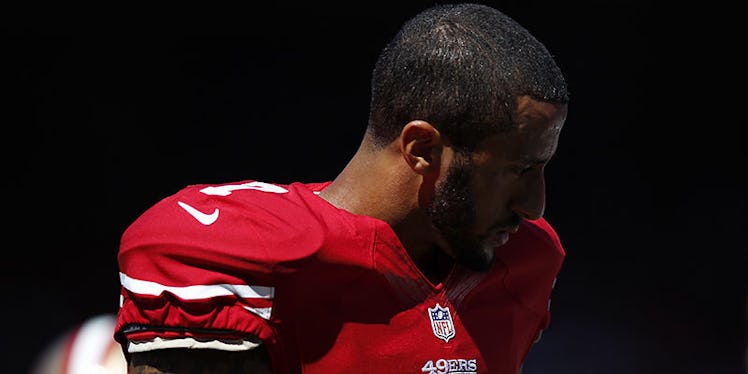
Here's How To Avoid Sounding Like A Fool When Talking About Colin Kaepernick
On Tuesday, former NFL safety Rodney Harrison had both the funniest and saddest moment within the broad discourse about Colin Kaepernick and the National Anthem.
Hours after claiming in a radio interview that Kaepernick -- who is definitely black -- is not black, the former NFL player apologized via a series of tweets, which included a golden caveat.
In other words, with respect to Kaepernick's blackness, Harrison literally had no idea what he was talking about.
And even though one might be tempted to ask what Harrison could have possibly been thinking, here's a better question: what was he doing talking about Kaepernick's race in the first place?
Once Kaepernick stated his reasons for sitting down during the National Anthem, there was one question that became much more important than all the others.
Is the way black people, specifically, are treated in America emphatically contradictory to the country's ideals?
That question, which is a literal matter of life and death for some people, is much more significant than the superficial, and arguably unimportant, subjects of how much money Kaepernick makes or who adopted him.
And yet, we've seen athletes and media members negligently fail to focus on what actually matters: whether or not significant oppression against black people exists.
And in the most notable cases, people have made total fools of themselves.
There was Harrison, who instead of discussing whether or not police brutality could discourage a person's faith in American ideals, chose to imply that Kaepernick -- who, again, is definitely black -- had less credibility on the subject for not being black.
It wasn't long before his point was exposed for being as stupid as it first sounded.
There was CBS announcer and former NCAA player Doug Gottlieb, who chose to resort to sarcasm while focusing on Kaepernick's contract.
It wasn't long 'til his views on race -- which include an unquantifiable and ridiculous belief that "99 percent of people" are against racism -- made him look ridiculous.
There was Michigan coach Jim Harbaugh, Kaepernick's former coach in San Francisco, who chose to focus on his issue with the method of protest, as if protests are meant to make people feel comfortable.
In doing so, he said he didn't respect Kaepernick's "motivation or the action."
It wasn't long 'til Harbaugh, who makes a living out of recruiting black people, realized how stupid it was to say he didn't respect someone standing up against the oppression of black people.
In all of these cases, people discussing Kaepernick's views on the National Anthem could have saved themselves the embarrassment if they didn't go out of their way to side-step the most important question: is there actual oppression of black people?
There is no other topic that is more important, and any genuine attempt to explore Kaepernick's words should start there. Even bringing up the idea of disrespecting veterans is not more relevant to this specific case, a point that ESPN's Stan Verrett spoke on expertly.
And if, somehow, someway, there are actually issues of discriminatory lending, housing discrimination, unequal pay and a skewed justice system that could combine to oppress people of color, as Varrett implies, then there really is no question what anyone should be talking about: the substance of Kaepernick's words.
Who knows, doing that might even save some us of from making fools of ourselves.